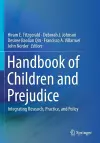
Handbook of Children and Prejudice
5 contributors - Paperback
£119.99
Hiram E Fitzgerald, Ph.D is University Distinguished Professor in the Department of Psychology at Michigan State University. His major areas of research include the study of infant and family development in community contexts, the impact of fathers on early child development, 0-5 age boys and risk, the etiology of alcoholism, and implementation of systemic community models of organizational process and change. He is a member of the Native Children’s Research Exchange, the Tribal Research Center for American Indian/Alaska Native Early Childhood Education, the national advisory board for the University of Nebraska Buffett Early Childhood Institute, and the external advisory board for the Oklahoma State University Center for Integrative Research on Childhood Adversity. He is a Fellow of the Association of Psychological Science, and of five Divisions of the American Psychological Association.
Deborah J. Johnson, Ph.D. is professor of Human Development and Family Studies and is also Director of the Diversity Research Network, a faculty serving entity under the auspices of Michigan State University’s Office for Inclusion and Intercultural Initiatives. Her research explores racially and culturally related development, parental racial socialization and coping, cultural adjustment from early childhood through emerging adulthood, in both domestic and international children and youth. Current work focuses on the influence of early bias preparation and coping at the intersection of gender and race among African American and Latina College women, and the impact on their well-being and school performance. Recent books, address the global rights of children and private/charter school experiences of African American children. Additionally, she studies cultural adjustment and identity development among unaccompanied Sudanese refugee minors and majors, and in international settings. Further explorations emphasize positive youth development and identity reformation of immigrant and refugee groups.
John Norder, Ph.D. (Spirit Lake and Turtle Mountain) is the Director of the Michigan State University Native American Institute, and an Associate Professor in Anthropology. His research and teaching interests include: Native American and First Nations archaeology, ethnohistory and anthropology, particularly in the Great Lakes region of North America. Current and ongoing work has focused on the ways in which traditional Indigenous knowledge is used as a tool of mediation between issues of identity, cultural and natural resource heritages, and economic development in the context of local and state level political negotiations.
Desiree Baolian Qin, Ed.D., is Associate Professor of Human Development and Family Studies at Michigan State University. Her research, funded by the William T Grant Foundation and the Spencer Foundation, focuses on understanding how immigration, culture, gender, and ecological contexts, especially family, impact adolescent and emerging adult development. Drawing on mostly mixed-method, longitudinal data, He er research has highlighted many nuanced, complex family processes that have been overlooked in Asian immigrant families, especially struggle in parent-child relations, e.g., emotional alienation, parent-child conflicts, communication challenges, and parent-child separation. Her findings also point to negative effects of tiger parenting in child/adolescent development. Dr. Qin’s most recent project examines academic and psychosocial adaptation challenges of Chinese undergraduate students.
Francisco A. Villarruel, Ph.D. is Professor and Associate Chair for Education in the Department of Human Development and Family Studies, and a University Outreach and Engagement Senior Fellow at Michigan State University. He is a founding faculty member of the GPI-Youth Development program - an online asynchronous master’s program for prospective youth professionals. Dr. Villarruel has worked with numerous communities, state, and federal agencies to address the involvement of Latino youth in juvenile justice systems programs. He serves on the Board of Directors for the Campaign for Youth Justice and is also working with colleagues across the nation to establish The Alianza for Latino Youth Justice – a consortium of practitioners, advocates, funders, families and scholars that seek to engage in culturally relevant practices to address the needs of Latino youth secure placements.